We guarantee 100% confidentiality
WHAT WE DO?
Control Search Results
Take charge of your online reputation. Using cutting-edge software, our in-house SEO experts, professional writers, legal tools, and advanced algorithm knowledge, we can craft a plan to promote the content you want visible while pushing negative content off the first page.
-
The average Google Search session is just under 1 minute. This means that within 1 minute the average user has already made
-
Up to 72% of people will make a decision to avoid you upon finding negative content online; and
-
88% of consumers trust online content as much as a personal recommendation.
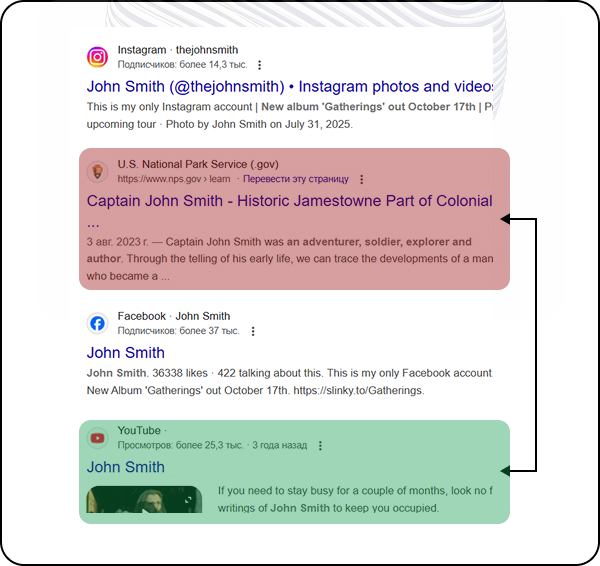
Google Orgranic CTR Breakdown by Position
If bad press ranks in the first few positions of Google for your brand or name, it's a major problem because most users never scroll past the first few results—and click-through rate (CTR) becomes a key signal that can either help bury the bad press or make it stick longer.
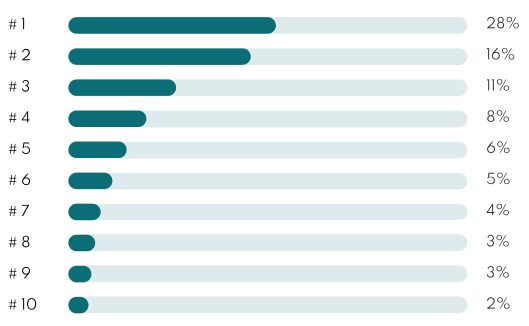
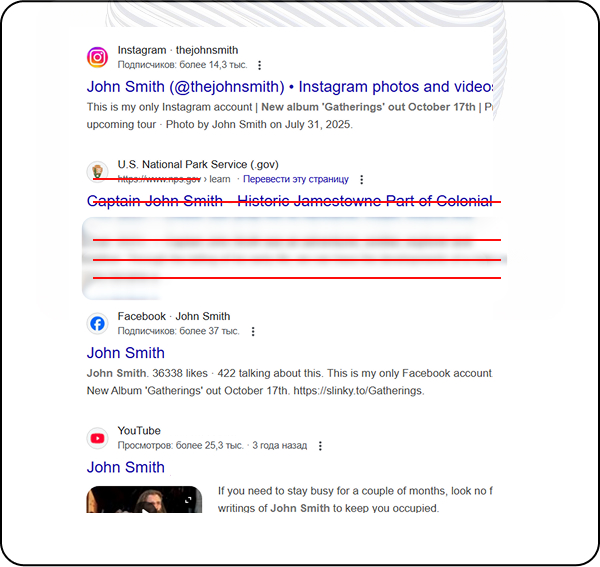
| Option | Effectiveness | Cost |
| #1.Waiting For Negative Articles To Naturally Fall Off The First Page | Low | Free |
| #2.Submit a DMCA (Digital Millennium Copyright Act) Takedown Notice on Google | Low | Free |
| #3. Hire an SEO Expert ⭐️Ross Kernez ⭐️ to Clean Your Name or Brand | High | $$ |
| #4. Reaching Out To Journalists to Remove Content from Google Search | Low | Free |
| #5. Explore Legal Strategies to Remove Negative Content Online | Medium | $$$ |
| #6. Requesting an Update To a Negative Article Via Email Outreach | Low | Free |
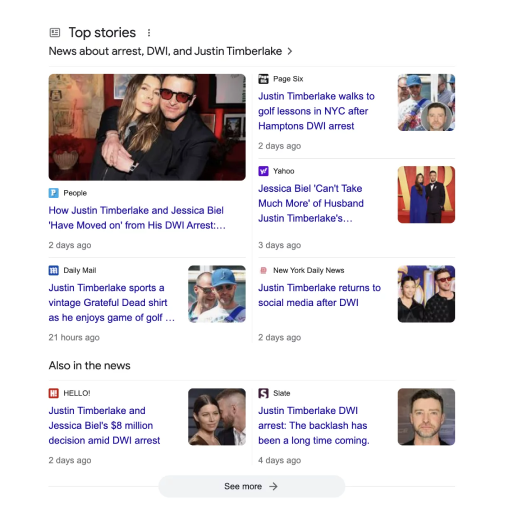
Waiting for Google’s freshness systems to let damaging headlines drift off Page 1 is a gamble no high-profile figure can afford. As long as a negative story keeps earning clicks, shares, or backlinks, its age doesn’t matter—recency signals will keep it pinned near the top of the results. Meanwhile your credibility, partnerships, and future deals remain exposed.
A dedicated reputation-management SEO steps in where algorithms fall short. By publishing timely, authority-building content, optimizing every asset you control, and responding quickly to new mentions, an expert pushes hostile coverage out of view before it cements itself. Continuous monitoring ensures fresh negativity is neutralized on arrival, while positive narratives are kept current and visible.
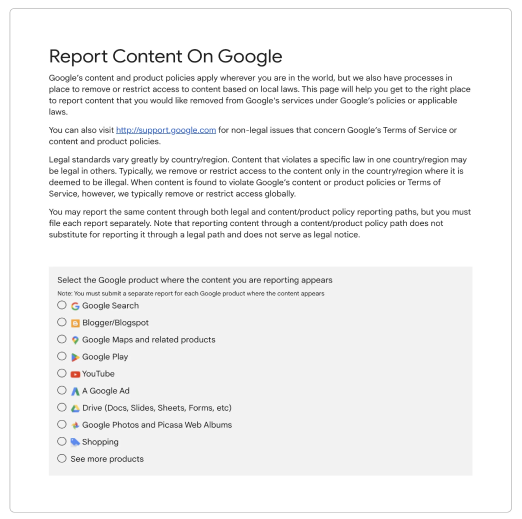
If a news site or blog has copied your protected work, the fastest route to removal is a formal DMCA takedown notice. First capture the offending URLs and keep screenshots or archived copies that prove the material is yours. Then open Google’s copyright-removal portal (support.google.com/legal/troubleshooter/1114905) and choose the relevant product—Search, YouTube, Images, and so on. Complete the form with your contact information, a clear description of the original work, the infringing links, and a sworn statement that you own the rights. Once submitted, Google reviews the claim and may ask for clarification; respond promptly to keep the process moving. When the notice is validated, the infringing URLs disappear from search results, cutting off traffic to the stolen content and protecting your brand.

When you partner with an experienced reputation-focused SEO like Ross Kernez, you gain a strategist who can tip Google’s scales in your favor. Ross orchestrates a multi-layered plan that blends positive news coverage, fresh websites, high-impact press releases, and a coordinated social-media presence—all designed to elevate favorable stories until they eclipse any negative links. Every move is bespoke: he audits the keywords and outlets that matter to you, then builds a content engine that keeps your best headlines front and center while quietly pushing harmful results out of sight. Outsourcing this work is more than a convenience—it’s a safeguard for your time and resources. Online reputation management demands constant vigilance, technical skill, and creative storytelling; by handing that responsibility to Ross, you stay focused on running your business instead of chasing algorithms. Behind the scenes he deploys enterprise-grade analytics, competitive intelligence, and monitoring platforms that most people never see, allowing him to spot threats early, refine tactics in real time, and deliver clear reports on progress.
Because Ross lives at the intersection of SEO, PR, and data science, his strategies evolve as quickly as Google does. Whether the challenge is an unflattering article, a viral rumor, or a sudden algorithm update, he adapts, neutralizes, and restores your digital narrative—ensuring that when someone searches your name, they find the story you’ve worked hard to write.

Approaching a journalist to address unfavorable coverage demands tact, respect, and a well-reasoned appeal. First, pinpoint the reporter and publication behind the piece, then review any stated correction policies so your request aligns with their standards. In your outreach—always personalized, never generic—acknowledge the journalist’s duty to report accurately and explain, with concise evidence, why the article is outdated, misleading, or factually incorrect. When possible, share verifiable documentation or fresh developments that paint a fuller, more current picture. If the story’s facts are sound but its timeliness has lapsed, courteously suggest an update that reflects your recent achievements. Offering an exclusive angle or new feature can transform your request into a mutually beneficial opportunity, giving the reporter valuable material while diffusing the impact of the original piece. Throughout every exchange, keep your tone professional and empathetic; journalists are under no obligation to revise or retract, so a respectful appeal is far likelier to succeed than a demand. Should direct contact fail, fold this effort into a wider reputation-management strategy—leveraging legal counsel or a specialized ORM service to pursue additional avenues for mitigation.
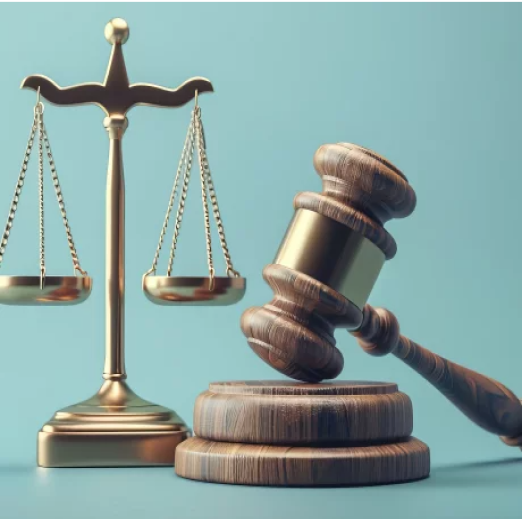
Taking a negative article to court may feel like a decisive fix, but defamation lawsuits rarely deliver the clean-slate you hope for. They are expensive, slow, and emotionally draining, demanding months—or years—of depositions, filings, and legal fees with no guarantee the offending content will ever disappear. Worse, the moment you file, the story can flare back into public view under the harsh glare of media coverage—the very Streisand-effect surge you were trying to avoid. Meeting the high burden of proof is another hurdle: you must show the statements are false, harmful, and published with actual malice, a standard that’s notoriously hard to satisfy—especially when opinions or subjective language are involved. Even a courtroom victory may leave the content online, now accompanied by headlines about the lawsuit itself. And once you’ve sued, every future interaction with journalists risks being colored by that adversarial history.
A far more effective path is proactive reputation management. By engaging directly with the content, supplying factual corrections, and flooding search results with accurate, positive stories, you shift the narrative without sparking a legal spectacle. That strategic, forward-looking approach protects your image today while preserving the relationships and goodwill you’ll need for tomorrow.

Approaching a journalist for an update requires tact, transparency, and proof—not confrontation. Open the conversation by acknowledging their professionalism and the value of accurate reporting, then present clear, verifiable evidence showing where the piece is outdated, unbalanced, or factually incorrect. Supplement your case with recent achievements, corrected data, or new context the original article missed. By framing your request as a shared commitment to accuracy rather than an attempt at suppression, you foster goodwill and make it easy for the writer to amend the story. The result is a more balanced article that protects your reputation while enhancing the publication’s credibility—an outcome that benefits both parties and quietly moves negative search results out of the spotlight.
What is Celebrity Online Reputation Management?
Celebrity Online Reputation Management (ORM) refers to the practice of monitoring, influencing, and maintaining the public image of high-profile individuals on digital platforms. For celebrities, public figures, influencers, or anyone in the limelight, managing online perception is crucial because their reputations can be easily affected by rumors, media narratives, social media chatter, and various forms of online content.
The primary goal of online reputation management is to protect a celebrity’s public persona, ensure the prominence of positive content, and suppress or remove negative or false information that could harm their image. This involves using a combination of SEO strategies, public relations tactics, social media management, content creation, and sometimes legal interventions. With the 24/7 nature of the internet and the speed at which stories can spread, managing a celebrity’s online reputation requires constant monitoring and rapid responses to any potential threats to their image.
Online reputation management for celebrities typically includes handling crisis situations such as scandals, addressing inaccurate or defamatory information, and helping public figures maintain a polished, consistent, and favorable online presence. ORM strategies also aim to highlight achievements, promote positive news, and align the celebrity with charitable causes, endorsements, or values that reflect their desired public image.
Why is Online Reputation Management important for celebrities?
For celebrities, their personal brand is often synonymous with their professional success. Their reputation impacts their relationships with fans, sponsors, the media, and their career opportunities. In today’s digital world, a celebrity’s online reputation can be shaped by everything from media articles and online reviews to social media posts and rumors. Since public perception can shift rapidly, it is crucial for celebrities to have a well-managed online reputation to ensure they maintain control over how they are portrayed and perceived.
A strong, positive online reputation can open doors to new opportunities such as brand endorsements, partnerships, film roles, or public speaking engagements. Conversely, a poor or tarnished online reputation can have serious repercussions, including the loss of contracts, sponsorships, or credibility with the public and the media. Furthermore, once negative or defamatory information is published online, it can be difficult to remove, potentially affecting a celebrity’s image for years to come.
Celebrity Online Reputation Management helps to proactively prevent damage to their reputation, while also enabling them to respond quickly and effectively to negative publicity or online crises. By managing their digital footprint, celebrities can maintain control over their brand narrative, ensuring that their public image reflects their values, achievements, and aspirations.
How does Online Reputation Management work for celebrities?
Online reputation management for celebrities involves a range of strategies and tactics designed to shape and protect their public image online. The first step is thorough monitoring of the celebrity’s online presence, including social media platforms, news websites, blogs, and forums. Reputation management professionals use specialized tools to track mentions, comments, and discussions about the celebrity, looking for any potential issues, trends, or misinformation that may require attention.
Once monitoring is in place, the next step is to address any negative or harmful content. This can include responding to inaccurate news reports, engaging with fans or critics on social media, and, in some cases, working with legal teams to remove defamatory content. For high-profile celebrities, even seemingly small issues can escalate quickly, so ORM services focus on containing potential crises before they become unmanageable.
Positive content creation is another essential component of ORM. This involves creating and promoting content that highlights the celebrity’s achievements, charitable work, endorsements, or other favorable aspects of their public persona. This content may be shared through social media, press releases, interviews, or other online platforms to ensure it ranks highly in search engine results, thus overshadowing any negative or outdated information.
Search engine optimization (SEO) plays a critical role in reputation management by ensuring that positive stories, interviews, and other favorable content appear prominently when people search for the celebrity online. The goal is to push down negative or irrelevant search results and promote content that reflects the celebrity’s desired image.
ORM also involves social media management, which includes crafting and posting content that aligns with the celebrity’s brand, engaging with fans, and ensuring that their social media presence is consistent, authentic, and professional. In times of crisis, ORM professionals may guide how to address specific issues on social platforms, ensuring that responses are appropriate and timely.
What are the benefits of Celebrity Online Reputation Management?
There are several significant benefits to implementing an effective celebrity online reputation management strategy. One of the most important benefits is protection against damage caused by negative publicity, false information, or malicious attacks. With a proactive reputation management strategy in place, celebrities can prevent harmful stories or online content from gaining traction or spreading uncontrollably. Whether it’s inaccurate reporting, online rumors, or social media backlash, a well-managed reputation ensures that the celebrity’s image remains intact.
In addition to damage control, ORM helps celebrities build and maintain a positive public image. Promoting positive content, such as news about accomplishments, partnerships, charity work, and endorsements, can enhance the celebrity’s appeal to fans, brands, and the media. This can lead to more opportunities, including sponsorship deals, media appearances, and professional growth.
Celebrity ORM also helps with crisis management. In the event of a scandal or crisis, having an established ORM team allows celebrities to respond quickly and professionally, preventing long-term harm to their image. Timely responses and controlled messaging are key to minimizing the impact of any negative situation.
Another benefit is increased control over how the celebrity is perceived by their audience and the media. With proper online reputation management, celebrities can take charge of their digital narrative, rather than leaving it to chance or external sources. ORM allows them to shape their online presence in a way that aligns with their personal or professional goals.
Overall, ORM provides peace of mind. Knowing that there is a dedicated team actively monitoring and managing their online presence allows celebrities to focus on their career and personal life without worrying about unexpected damage to their reputation.
Can Celebrity Online Reputation Management remove negative content from the internet?
Removing negative content from the internet can be challenging, and whether it can be fully removed depends on the nature of the content and where it is published. In some cases, ORM professionals can successfully remove harmful or defamatory content by contacting website administrators or social media platforms and requesting its removal. This is more likely to be successful if the content violates the platform’s terms of service, such as in cases of harassment, defamation, or privacy violations.
In more serious cases, such as defamation or privacy breaches, legal action may be necessary to compel the removal of content. This often involves sending cease-and-desist letters or pursuing legal remedies to have harmful content taken down.
However, it’s important to note that not all content can be removed, especially if it is hosted on independent websites or news outlets that have editorial control. In these cases, ORM professionals focus on suppressing negative content rather than removing it. They use SEO strategies to promote positive content and push down negative stories in search engine rankings, making them less visible to the public.
Overall, while it is possible to remove some negative content, ORM is often more about managing the visibility of content and ensuring that positive stories and accurate information dominate the narrative.
What types of issues can Celebrity Online Reputation Management address?
Celebrity Online Reputation Management can address a wide range of issues that could potentially harm a public figure’s image or career. One of the most common issues is the spread of negative or false information. This could include malicious rumors, inaccurate news stories, or defamatory content published on blogs, social media, or news outlets. ORM teams can respond to these issues by correcting misinformation, contacting publishers to remove false content, or using SEO strategies to push down negative content in search results.
Another issue that ORM addresses is social media backlash or viral negativity. In the age of social media, a single post or comment can go viral, leading to a surge of negative attention. ORM professionals help manage these situations by monitoring social media platforms, responding to negative comments or posts, and providing crisis communication strategies to mitigate the damage.
Celebrities are also vulnerable to privacy breaches, such as the unauthorized release of private information, images, or videos. In these situations, ORM teams can work with legal professionals to remove the content and minimize its spread. They also help protect the celebrity’s online privacy moving forward.
ORM can address reputation damage caused by scandals, controversies, or public disputes. These situations can severely impact a celebrity’s image, especially when they are played out in the media. ORM services focus on damage control, including managing the media narrative, issuing public statements, and guiding the celebrity on how to handle the situation publicly.
Other issues that ORM can handle include brand misalignment, where a celebrity’s public actions or endorsements may not align with their desired personal brand, as well as challenges with fan or media engagement. ORM professionals can help realign the celebrity’s messaging and actions to ensure they resonate with their audience.
How does ORM protect a celebrity during a crisis?
During a crisis, a celebrity’s reputation can be at serious risk if the situation is not handled quickly and effectively. Celebrity Online Reputation Management teams specialize in crisis management, working to protect the public figure’s image and minimize any potential damage. The first step in crisis management is rapid identification of the issue. Whether the crisis involves a scandal, negative press, or a social media backlash, the ORM team closely monitors mentions and trends related to the celebrity. This allows them to act swiftly before the situation escalates further.
Once the issue is identified, the ORM team assesses the severity of the crisis and develops a tailored strategy to address it. This may include issuing an official statement, guiding the celebrity on how to respond (if at all), and working with the media to shape the narrative in a more favorable direction. The timing and tone of the response are crucial in controlling the situation and preventing it from spiraling out of control.
In cases where the crisis involves inaccurate information or defamatory content, the ORM team may work to have the content removed, either through negotiations with publishers or through legal channels. If the issue involves social media, ORM professionals will often engage with users to clarify the situation or respond to negative comments in a way that reflects positively on the celebrity.
Throughout the crisis, ORM teams ensure that the celebrity’s social media presence remains consistent and professional. In some cases, this means pausing certain types of posts while the crisis is being managed to avoid further complications. At the same time, the ORM team may promote positive content or past achievements to help balance out the negative coverage.
After the immediate crisis has been managed, ORM professionals continue to monitor the situation and work to rebuild the celebrity’s reputation. This often involves highlighting new accomplishments, generating positive press, and ensuring that future media coverage aligns with the celebrity’s desired image.
What role does SEO play in Celebrity Online Reputation Management?
Search Engine Optimization (SEO) plays a crucial role in Celebrity Online Reputation Management by helping to control what appears when people search for a celebrity online. The goal of SEO in ORM is to ensure that positive, accurate, and relevant content ranks highly in search engine results, while negative or outdated information is pushed down to lower positions where it is less likely to be seen.
ORM professionals use SEO techniques to promote favorable content, such as news articles, interviews, social media profiles, official websites, and other positive online assets. By optimizing these assets with relevant keywords, tags, and metadata, they increase the likelihood that this content will appear at the top of search engine results when someone searches for the celebrity’s name.
Conversely, SEO is also used to suppress negative content. For example, if harmful or defamatory stories appear high in search results, ORM professionals can use SEO strategies to create new, positive content that outranks the negative material. Over time, this shifts the focus of search results toward more favorable content, which helps protect the celebrity’s online reputation.
SEO also ensures that the celebrity’s official website and social media profiles are properly optimized to appear in the top search results. This gives them more control over their digital presence and ensures that the content they want to promote is the first thing people see when they search their name.
SEO can also be used to target specific issues. For instance, if a celebrity is facing a particular controversy, the ORM team might create positive press or content addressing the issue in a way that clarifies the situation. This content is then optimized to rank well in search engines, helping to control the narrative.
What tools and techniques are used in Celebrity Online Reputation Management?
Celebrity Online Reputation Management involves a variety of tools and techniques to monitor, manage, and influence a celebrity’s online presence. One of the most important tools used in ORM is media monitoring software. These platforms track mentions of the celebrity across social media, news websites, blogs, and forums. By monitoring online conversations in real time, ORM teams can quickly identify potential issues, trends, or negative sentiment that needs to be addressed.
SEO tools are another key component of ORM. These tools help identify keywords and phrases that are associated with the celebrity’s name and optimize content to ensure that positive stories, interviews, and social profiles rank well in search engine results. SEO is also used to suppress negative content by promoting new, positive material that outranks harmful stories.
Social media management tools are used to monitor and manage the celebrity’s presence across platforms like Instagram, Twitter, Facebook, and TikTok. These tools allow ORM professionals to schedule posts, track engagement, and respond to comments or direct messages in a timely manner. Social media management also ensures that the celebrity’s profiles remain professional, consistent, and aligned with their brand.
Content creation and PR techniques are used to generate positive press and content. This might involve writing articles, press releases, or blog posts that highlight the celebrity’s achievements, charitable work, or partnerships. These pieces are then distributed through media outlets, social media, or the celebrity’s own platforms to ensure a steady flow of positive content.
Legal tools and strategies are sometimes necessary, particularly in cases of defamation or privacy violations. ORM teams work with legal professionals to remove or take down harmful content, using legal action if needed to protect the celebrity’s reputation.
Finally, analytics tools are used to measure the effectiveness of ORM strategies. These tools track key metrics such as search engine rankings, sentiment analysis, social media engagement, and overall online visibility. By continuously analyzing these metrics, ORM professionals can adjust their strategies to improve results and ensure the celebrity’s reputation remains protected.
How long does Celebrity Online Reputation Management take to see results?
The time it takes to see results from Celebrity Online Reputation Management depends on several factors, including the severity of any existing issues, the volume of online content, and the specific strategies being used. For some minor issues, such as negative social media comments or a small-scale backlash, results can be seen relatively quickly—often within days or weeks. In these cases, ORM professionals can respond to the issue swiftly, correct misinformation, and promote positive content to restore the celebrity’s image.
For more significant challenges, such as a major scandal, widespread negative press, or the spread of defamatory content, it can take longer to see substantial improvements. In these situations, it may take months to fully manage the crisis, remove harmful content, and rebuild the celebrity’s online presence. The ORM team will typically use a combination of strategies, including content creation, SEO, and legal action, to gradually improve the celebrity’s reputation over time.
In general, online reputation management is an ongoing process. Even after the initial crisis or issue has been resolved, celebrities often need continuous monitoring and management to maintain a positive online presence. The internet is constantly evolving, and new content can appear at any time, so ORM professionals work to ensure that the celebrity’s reputation remains protected in the long term.

